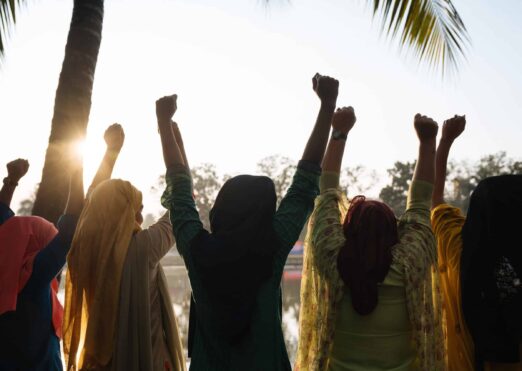Survivors benefiting from peer-led programme, new evaluation indicates
May 17, 2024
Justice and Care’s peer-led aftercare programme is empowering modern slavery survivors personally and professionally, a promising external evaluation has indicated.
We set out to improve services for survivors in Bangladesh after examining the challenges with recovery and integrating back into society.
Our programme sees 20 Champion Survivors, who have received extensive aftercare support and gained experience as peer mentors, employed to work alongside our team as Aftercare Facilitators (ACFs).
With funding from UK International Development, they are taking the next step in their path to reintegration and empowerment by using their experience to professionally support other survivors in their recoveries.
To monitor the impact of the programme, and to provide ongoing recommendations for improvements, we have hired a team of researchers to run an external evaluation. So far, this has involved more than 50 in-depth surveys and 40 interviews with survivors, Champion Survivors, family members and JCBD team members.
ACFs have been provided with intensive training, ongoing professional supervision, mentoring, salaries and support, and it has been found they are rapidly developing the strong professional skills and mental resilience needed to perform their roles to the highest standards.
They report gaining satisfaction from knowing that they are good at their jobs and channelling their energy towards doing something positive.
Evaluators were told that ACFs take great pride in their professional roles, with one saying: ‘Now, when I tell others that I am doing a job, I feel the pride. I feel my head is held high when I tell [others].’
Survivors, who were exploited in horrific situations often struggle when they return to Bangladesh as they are ostracized or burdened with social stigma. But ACFs report that their roles have led to improved social connections and relationships within their families and wider communities.
While they were previously experiencing discrimination or exclusion, they are now being ‘valued’ and treated with greater deference and respect: One person said: ‘Those who used to point [the] finger towards me, now lower their eyes when talking with me.’
The results of the evaluation also pointed to the programme being beneficial to survivors, with clients rating ACFs highly in terms of quality of service, trust, and ease of communication.
Many mentioned the special connection that they have with their ACF based on their shared lived experiences and said they see Champions as role models.
‘I can share everything – good or bad’, one person said, while another added: ‘One day they were like me. Now with the support, they have reached this point. They will obviously give me a good suggestion, Their [sharing of experience] gave me a good feeling.’
Evaluators noted it is too early to conclude about the effectiveness of the aftercare programme without comparable pre-intervention data – but said their findings suggest the holistic care Justice and Care offers significantly contributes towards the recovery and reintegration of survivors, and the peer- led support provided by the ACFs is of additional value to them.
Justice and Care is dedicated to assessing the benefits of the programme and the external evaluation will run for the duration of the project.
All donations to Justice and Care will be doubled from April 15 to May 24 2024 in honour of the Champion Survivors. Donate here to enable even more survivors to flourish and live life on their own terms.
The Champion Survivor programme is made possible by UK International Development from the UK Government.



